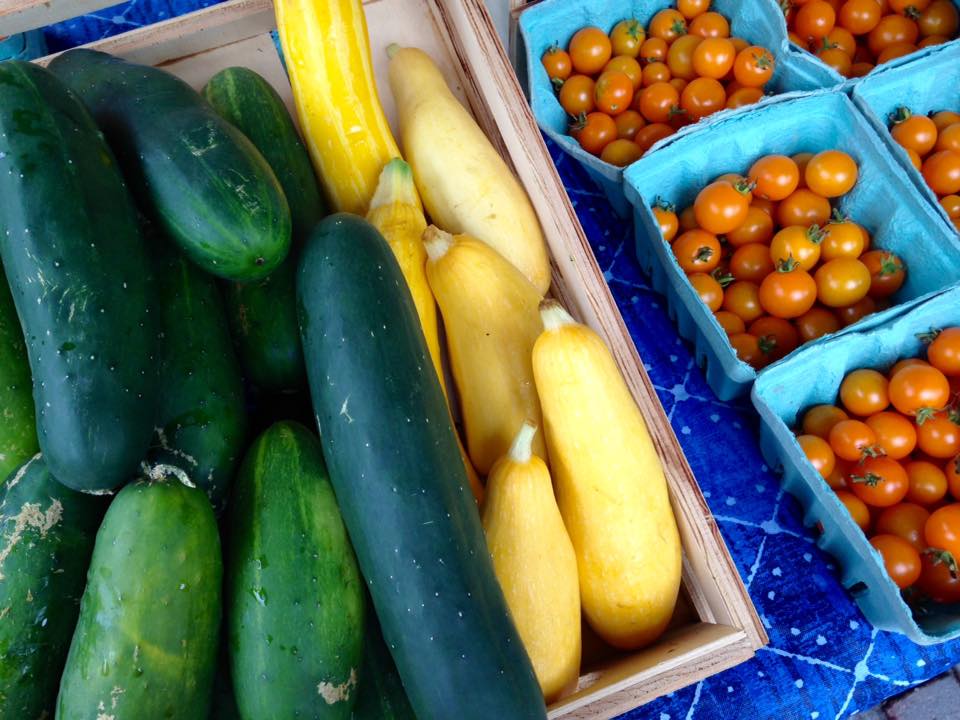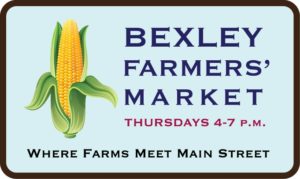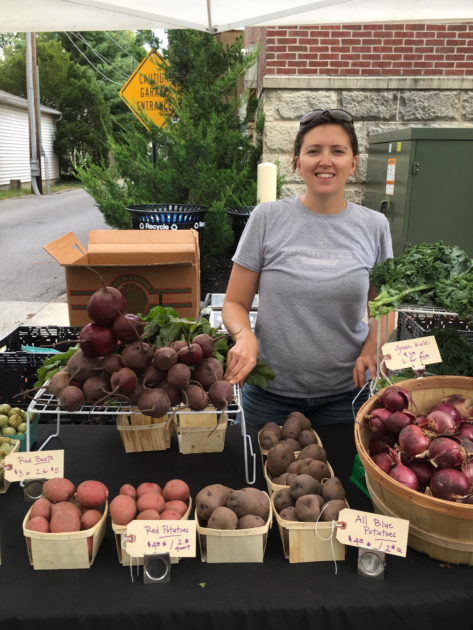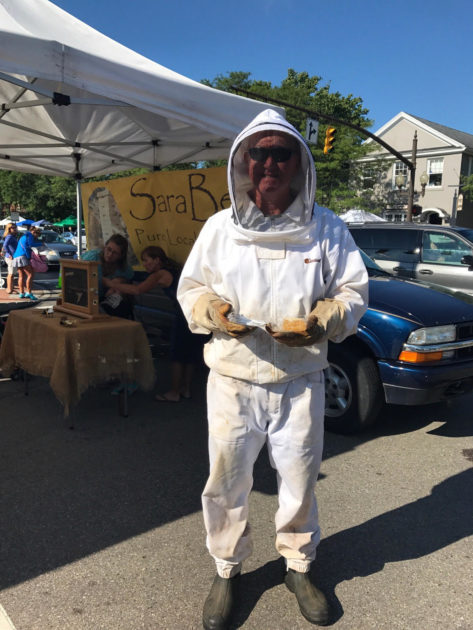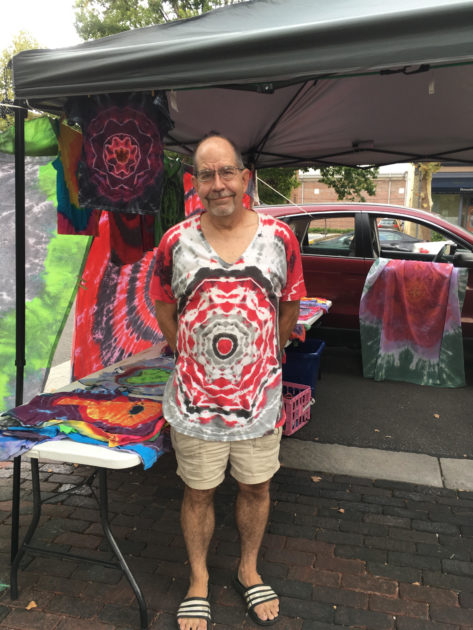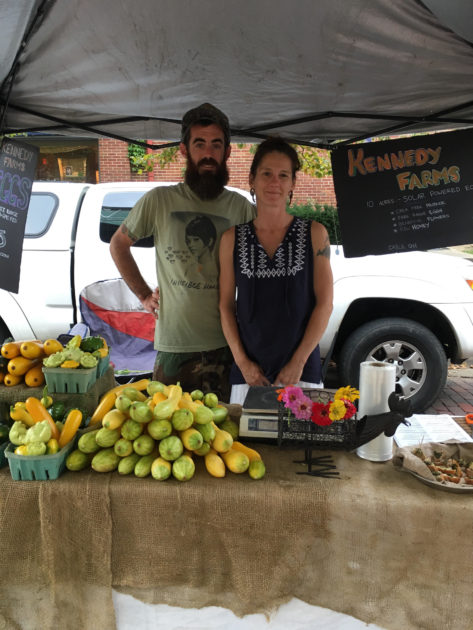While incoming students learn about the reputation of the nearby Kroger and Walmart, students might be wondering where else they can buy their food. Are they stuck paying the sometimes unreasonable Market District prices, or is there another alternative?
The Bexley Farmers’ Market provides a healthy and sustainable option for both Capital University students and Bexley community members. Just a short walk from campus at the corner of Dawson and Main, the Bexley Farmers’ Market is held every Thursday from 4-7 p.m., from May to October.
The market is a vision of community and has been in operation since 2011. Blocked off from the rest of the neighborhood, as many as 20 producers line the brick-paved street. Visitors are welcomed by live music, as well as the opportunity to escape schoolwork or even just the traffic of Main Street.
The Bexley Farmers’ Market’s mission statement is to provide access to local foods; assist area farmers, producers, and artisans with sustainable business opportunities; further the economic development of the community; educate the public and promote healthy living; and to serve as a community-gathering place to build community spirit.
Jaime Moore of Wayward Seed Farm is at the heart of the Market. Located next to the information booth, Moore serves two roles: as a producer and the market manager.
Moore grew up in Fremont, a farming town, and got her start picking fruit in the summer and canning with her mother and grandmother growing up. Moore, an OSU graduate, got involved with the North Market, and eventually she and her business partner, Adam Welly, came up with the idea for Wayward Seed Farm. Wayward Seed Farm has been in operation since 2006 and sells a variety of vegetables and fall storage crops at not only the Bexley Farmers’ Market, but also at the Worthington Farmers’ Market and several Columbus based grocery stores and restaurants.
When asked what “buy local” means to her, Moore responded, “’Buy local’ is more than taking people’s word for it.”
She acknowledges that “buy local” can be challenging idea, but she invites consumers to ask more questions saying, “there are no stupid questions.” At a farmers’ market, there is a comfort in knowing that you can get to the bottom of what you are buying, you can ask about a producer’s farming practices, and you can be certain that you are receiving a quality product.
Recommended: Her kale and tomatoes look amazing. Also, talk to her about anything. Moore has a wonderful personality and an amazing story!
Barry Keller of SaraBee Pure Honey offers a sweet look at how to treat your seasonal allergies. SaraBee Pure Honey is a family owned and operated business from Circleville. The name was chosen after Berry and Shelby Keller’s daughter Sarah.
Keller and his wife both work full-time jobs but started beekeeping nine years ago out of a desire to produce their own honey. Now, with over 50 beehives, they have turned it into a business. Their honey is harvested twice a year, and they offer “Summer Weather” and “Fall” honey accordingly.
SaraBee Pure Honey can also be found at the Hilliard, Worthington, and Powell Farmers’ Markets. Keller is excellent with kids, loves to hand out samples, and educates both kids and adults about bees and honey bee awareness.
Keller keeps a Columbus Dispatch paper out at his booth to show customers what the allergy report is for the week. A large portion of SaraBee’s business is from people looking to treat their seasonal allergies. Keller explains that “honey that is harvested locally is able to offset some of those [seasonal] allergies and help build up their immune systems.”
Recommended: Check out the Fall Honey if you are experiencing seasonal allergies, but also because it tastes fantastic!
Larry Todd, aka Tie Dye Larry, offers a way to brighten up your day and even your dorm room with his tie-dye creations. Todd got started in tie-dye through helping a friend with his tie-dye business. Todd has been selling his own products since 2012 after retiring from a sales job of selling mostly pool tables. A Bexley local, Todd also sells his products on Facebook, at flea markets, and at nearby fairs and festivals.
When asked what “buy local” meant to him, Larry explained, “’Buy local’ means keeping money in the community, which is going to help any community prosper and grow.”
Recommended: Check out his tapestries, or his large collection of scarlet and gray t-shirts.
Stephanie Kennedy of Kennedy Farms offers a variety of products and is a great resource to learn about eco-farming. Kennedy, originally from Texas, grew up in a tenant farming family. Kennedy did a stint in Cameroon on an agricultural development project, helped with the “Buy Fresh Buy Local” movement in California and got involved with farmers’ markets through a co-op and getting to know Jaime Moore at the Worthington Farmers’ Market. Kennedy is in her fifth season of farming, and is assisted by Jonathan Ryan and Mark Star.
Based in Cable, Ohio, Kennedy Farms is a ten-acre eco-farm that specializes in honey, free-range eggs, and chemical-free produce. She explained that eco-farming is “working with the ecology of the farm,” and that it is “more than organic.” Kennedy Farm’s products can also be found at the Bellefontaine Farmers’ Market and Logan County Restaurant.
When asked what “buy local” meant to her, she explained, “’Buy local’ is more than what is grown in Columbus, it’s what is half an hour away, an hour away.”
She explained through her work with the “Buy Fresh Buy Local” movement in California, that “buy local” is about education and supporting the local economy
Recommended: Check out her flowers and try her pesto!
The producers of The Bexley Farmers’ Market offer a face to the “Buy Local” movement. The Bexley Farmers’ Market is great because it brings the community together. It is an excellent resource for Capital students to start making eco-conscious purchases, ask questions about sustainable farming practices, and contribute to the local economy. It’s a great way to spend a Thursday evening; you never know what you will end up buying, or who you might end up meeting.

